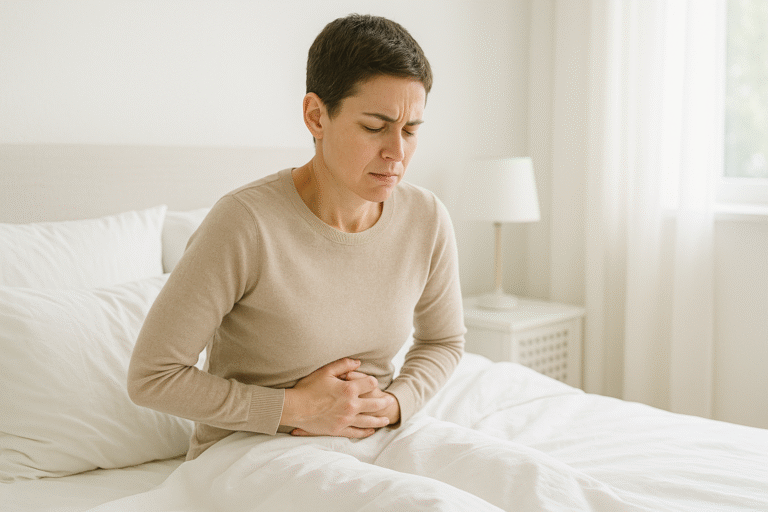Living with Crohn’s disease isn’t easy; flare-ups show up uninvited, pain tags along, and stress piles up. But if you want to see how coping strategies for Crohn’s disease help you take back control, read on. As someone who has walked this path for years, I understand the challenges it brings – the chronic pain, the uncertainty, and the constant adjustments needed to navigate daily life. But I’m here to tell you that despite the setbacks, your coping strategies help you manage pain, stay active, and get through the hard days with less friction. In this guide, I’ll share practical advice on managing chronic pain and living well with Crohn’s disease.
Understanding Crohn’s Disease
Crohn’s disease is an inflammatory condition that affects the digestive system, causing symptoms like abdominal pain, diarrhoea, fatigue, and low energy. If you’re reading this, chances are you or someone close to you has been diagnosed with Crohn’s, and you’re seeking guidance on how to manage its impact on your life.

Embracing Medication Management
One of the cornerstones of coping strategies Crohn’s disease is consistent medication routine. Follow your doctor’s plan to cut inflammation and reduce the risk of your day being wrecked by a sudden flare-up. Missing doses or altering your medication regimen without consulting your healthcare provider can disrupt your treatment plan and make symptoms spiral.
Harnessing the Power of Nutrition
What you eat can be the difference between calm and chaos. Nutrition and Crohn’s disease self-management go hand in hand. While certain foods may trigger flare-ups, others can promote gut health and symptom relief. Working with a registered dietitian can be invaluable in creating a personalised meal plan tailored to your gut and your day-to-day energy needs. They can also help you identify food intolerances or sensitivities and make appropriate adjustments to your diet.
Prioritising Physical Activity
Light exercise helps digestion, lowers stress, lifts your mood and keeps fatigue from running the show. Exercise helps maintain a healthy digestive system, reduces stress levels, and improves sleep quality. Incorporating physical activity into your routine, whether it’s walking, swimming, or yoga, can enhance your well-being and help make Crohn’s feel more manageable. Be sure to consult with your healthcare provider before starting any new exercise regimen.
Creating a support network
Crohn’s can be lonely. That doesn’t mean you need to face it by yourself. Connecting with others who share your experiences can provide invaluable support and encouragement. Consider joining support groups, participating in online forums, or starting your own blog or social media account to connect with fellow Crohn’s warriors. Having people who get it can change everything.
Managing Stress Effectively
Stress hits? So do symptoms. It’s no coincidence that activities such as yoga, meditation, deep breathing exercises, and hobbies can help drop tension levels before symptoms start shouting. Remember to prioritise self-care and carve out time for stuff that actually makes you feel better, not just distracts you.
Putting strategies into practice
I understand that implementing these strategies may seem daunting, especially when you’re dealing with chronic pain and fatigue. But remember, progress is made one step at a time. Start by focusing on one strategy that resonates with you and gradually incorporate others as you feel ready. Small changes beat heroic plans every time.
Living with Crohn’s disease presents its challenges, but with the right strategies and support, it’s possible to manage your symptoms effectively and lead a fulfilling life. By prioritising medication management, nutrition, physical activity, building a support network, and managing stress, you can take control of your health and thrive despite the obstacles. Remember, you’re not alone in this journey – reach out for support, ask questions, and never lose hope. Together, we can navigate Crohn’s disease and live life to the fullest.
Behavioural Tricks that Stick
Your day is a chain of micro-decisions. Each one either calms your gut, or pokes it with a stick. A behavioural economist might introduce the concept of “smart defaults.” Imagine pre‑packing stress‑busting items (yoga mat, earphones) by your door so staying calm requires less effort than panicking.
Here’s a short story. One patient told me how leaving a water bottle and a gentle exercise plan by her bed meant she started every morning hydrated and moving, cutting fatigue by half. She didn’t set a goal to be perfect. She set defaults that made feeling better the default.
Here’s another nudge: when pain or stress hits, try a reverse countdown. Breathe in for 4, hold, breathe out for 6. Oddly, timing the exhale longer than the inhale flips your nervous system into calmer mode. That’s not self-help fluff. That’s your nervous system doing actual work.
And here’s a counterintuitive truth: how you think about pain can actually change how much it hurts. A 2024 paper in Pain Reports1 found that reframing pain—treating it as information rather than a threat—can reduce how intense it feels. By naming the pain, setting mental boundaries around it, and seeing it as a passing signal rather than a permanent enemy, you interrupt the emotional spiral that makes it worse.
Finally, diet exercise Crohn’s disease plans don’t need to be heroic. A 10‑minute post‑lunch walk activates digestion and mood chemicals sooner than a dramatic three‑hour gym visit chosen once a week. It’s small habits stacked over time that win.
Common Questions
Yes, Crohn’s disease can indeed cause chronic pain, which is often one of the most challenging symptoms to manage. The inflammation and damage to the digestive tract caused by Crohn’s can lead to persistent abdominal pain, discomfort, and cramping. It’s essential to work closely with your healthcare provider to develop a treatment plan that effectively addresses pain management while managing the underlying condition.
Yes, fatigue is a common symptom of Crohn’s disease and can significantly impact daily life. The inflammation and malabsorption associated with Crohn’s can lead to fatigue, as well as other factors such as anaemia and medication side effects. To manage fatigue, it’s essential to prioritise rest, maintain a balanced diet, stay hydrated, and incorporate gentle exercise into your routine. Additionally, managing stress and seeking support from healthcare professionals and support networks can also help alleviate fatigue associated with Crohn’s disease.
Effective coping strategies for Crohn’s disease flare-ups include following your medication plan, identifying food triggers, managing stress, and getting plenty of rest. Keeping a symptom diary can help spot early warning signs. Staying consistent with treatment and making small daily changes helps reduce flare-up severity and frequency.
A balanced Crohn’s disease diet combined with light exercise can improve digestion, energy levels, and reduce inflammation. Avoiding trigger foods, eating smaller meals, and choosing gut-friendly options can ease symptoms. Gentle exercise like walking or yoga supports digestion and improves overall well-being without overexerting the body.
Stress management techniques for Crohn’s disease include deep breathing, mindfulness, progressive muscle relaxation, and scheduling regular downtime. Lowering stress can reduce flare-up triggers and ease abdominal pain. Making these routines part of your daily life helps your body and mind stay calm and more resilient.
Building a support network helps improve mental health with Crohn’s disease by reducing isolation, offering emotional reassurance, and sharing practical tips. Connecting with others through online communities, local groups, or peer support can reduce anxiety and make it easier to manage daily challenges.





